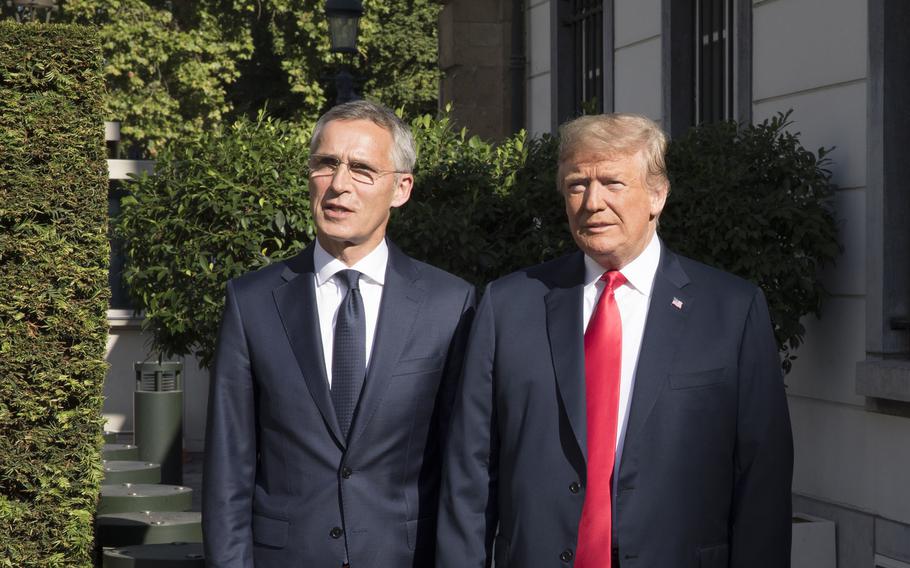
U.S. soldiers exchange military meals ready-to-eat with a Lithuanian soldier during a break in training at Pabrade Training Area, Lithuania, July 13, 2023. The Senate on July 19 passed an amendment to next year's defense authorization bill that would prohibit any president from unilaterally pulling the country out of the NATO alliance. ( Oscar Gollaz/U.S. Army)
A bill making its way through Congress seeks to prohibit presidents from unilaterally pulling the country out of NATO, a move that coincides with alliance skeptic Donald Trump’s front-runner status as the Republican presidential nominee in 2024.
By a 65–28 vote Wednesday, the Senate passed the bipartisan amendment to the pending 2024 National Defense Authorization Act. All the no votes were cast by Republicans.
Withdrawal from NATO would require two-thirds approval in the Senate or an act of Congress under the provisions of the legislation.
“America is strong on our own and even stronger with our allies,” Sen. Tim Kaine, D-Va., said in a statement Wednesday. “Congress stands with this historic alliance.”
Florida Republican Sen. Marco Rubio, a co-sponsor, said in a statement any attempt to leave NATO would require rigorous debate and the input of the American people.

A combat controller assigned to the 352nd Special Operations Wing controls the landing of two U.S. Army UH-60s during NATO training near Daugavpils, Latvia, June 28, 2023. The Senate on July 19 passed an amendment to the 2024 defense authorization bill that would prevent any president from unilaterally pulling out of NATO. (Kaitlyn Danner/U.S. Air Force)
“NATO serves as an essential military alliance that protects shared national interests and enhances America’s international presence,” Rubio said.
The bill also would prohibit any funding to support a withdrawal from the alliance should a president attempt to leave NATO without Senate approval. The bill further authorizes Congress to challenge an administration in court over the matter.
For decades, the U.S. commitment to NATO was never a source of contention in the political mainstream, where support was bipartisan.
However, the Trump presidency created doubts, given his open questioning of the value of the alliance and the U.S.’s place in it.
Trump also made lackluster defense spending by many European countries, most notably Germany, a centerpiece of his criticism that U.S. taxpayers were subsidizing security in Europe.

NATO Secretary-General Jens Stoltenberg and then-U.S. President Donald Trump at a meeting during the NATO Summit in Brussels in 2018. The Senate on July 19, 2023 passed an amendment to the 2024 defense authorization bill that would prevent any president from unilaterally pulling out of NATO, a move that comes as Trump, a NATO skeptic, leads Republican candidate polls. (NATO)
Still, NATO enjoys broad support among Americans, with polling routinely showing majorities across the political spectrum hold favorable views of the alliance. Spending also has increased significantly among NATO nations in the past few years, though many countries remain below the alliance’s fiscal targets.
Now made up of 31 countries, NATO originally was founded to counter the Soviet Union in Europe. Following the Soviet demise, the relevance of the organization was often questioned by critics, even if disbanding it never was considered seriously.
However, Russia’s 2022 full-scale invasion of Ukraine has rejuvenated NATO and brought back a Cold War-era focus on defending Europe from potential Kremlin aggression.
The legislation now moves to the House of Representatives, which is controlled narrowly by the Republicans. The NDAA has met resistance from some members of the fractious House GOP caucus, mostly in relation to social issues.